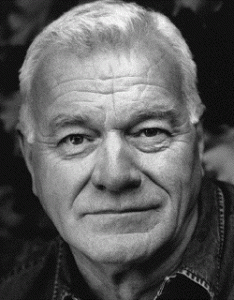When readers’ eyes confront the homogenous sheets of a Shakespeare manuscript, any actor would insist that the sheer words flatten the fullest potential of the plays. At best in a perceptive reading, shadows of tones emerge as rhetorical implications.. The critical eye, as a holistic overarching consciousness often prefers to gravitate to rhetoric, images, and themes. The characters aren’t as much individuals as tropes, or fragments subsumed into a whole. But an actor/actress, whose entire vocation depends on a single character, can afford no such flexibility. Any indecision will shout mediocrity to the keenly peering audience. Absorbing this more demanding interpretation can be rewarding to literary readers who never plans to must the gall to step on stage. To this end, actor Phillip Voss’ award-winning essay on his role as Prospero in The Tempest is a particularly fine example for this exercise.
Voss’ essay roughly narrates his deliberations during the buildup to his performance in James McDonald’s touring Royal Shakespeare company performance in 2000-2001. The essay contextualizes the actor’s choices that necessarily must appear spontaneous on stage. This considerably extends the insight into the process itself. The plainness, even the unsurely of the tone is staunchly non-academic.
From the beginning, Voss centralizes his interpretations around the primacy of “super-objectives”. These “super-objectives”, he insists, and shade further interpretations of particular lines. In searching for such foci, he recalls be resolutely resistant the common angry and bitter portrayals that limit Prospero with his revenge motivation. Somewhat opaquely, Voss decides that this tension is “resolved within him”, as opposed to a definitive outward attitude. Personally, I almost wished to see this performed, to see what such inward resolution would look like. (Furrowed, angry eyebrows are an easier mental picture.)
Voss likewise denies that an obsession with dynasty preoccupies Prospero. Voss sees this drama resolved in the action of the play with marriage, as essential to the course of action but still not worthy of super-objective status in Prospero’s individual character.
To summarize, Voss fixates on a rather innovative “super-objective”, an “incredibly brave”. To Voss, Prospero doesn’t harbor or whet his rage, but gradually relinquishes it- his magic, his power, his control. Voss breaks his magical staff earlier than most Prospero to signify this point. Additionally, Voss refuses to see this forfeiture as a catharsis, but instead pessimistically concludes that, “I think he renounces magic to face up to the awfulness of life”.
Across the essay, Voss also discusses the particulars of interpretation, though entirely reproducing his decisions here would be excessive. For example, Voss reaffirms the original capitalization of certain nouns within the text as a suggested accentuation, such as: “The Cloud-capped Towers, the gorgeous Palaces,/ The solemn Temples, the great Globe itself” 4.1.153-154). The capitalizations are more authentic to the text than punctuation, Voss asserts. “Look at the way Shakespeare writes, and he’ll tell you what he wants”, Voss plainly assures.
Ultimately, more fascinating than his particular decisions is how he arrives upon them. Overall, the process doesn’t exude the confidence that undoubtedly appeared on stage. Uncertainty and ambivalence prevail at many moments. He once recounts oscillating between central “super-objectives” several times. At another moment, recounts resolving on an important acting choice after “walks around the field with the dog”. Clearly, the product on the stage is not isolated, or contained, like the pages of a manuscript, but much more enmeshed with the individual. Perhaps, it’s impossible not to see the Prospero, to some extent, as a reflection of one man’s choices, deliberations, and own happenstance. Perhaps Shakespeare calculated such inevitable idiosyncrasies into his own plays. Perhaps he understood them to be endemic to his very trade. Regardless, the essay, in naturally chronicling the actor’s trade suggests that the renowned words on the actor’s manuscript might not be the only factor determining what reaches the audience.
(Voss’ essay “Prospero in The Tempest” is available in “Players of Shakespeare 5”, by Cambridge University Press)

